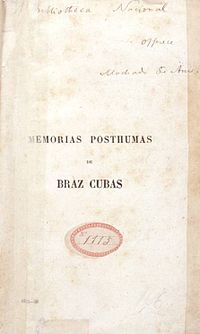- The Posthumous Memoirs of Bras Cubas
-
The Posthumous Memoirs of Bras Cubas 
The author himself dedicated this copy to the Bibliotheca Nacional, the National Library of Brazil.Author(s) Joaquim Maria Machado de Assis Original title Memorias Posthumas de Braz Cubas Translator Gregory Rabassa Country Brazil Language Portuguese Genre(s) Novel Publisher Oxford University Press (Eng. Trans. hardback edition) Publication date 1881 (1 October 1997 Eng. translation) Media type Print (Hardback & Paperback) Pages 238 p. (Eng. Trans. hardback edition) ISBN ISBN 0-19-510169-3 (Eng. Trans. hardback edition) OCLC Number 35586796 Dewey Decimal 869.3 20 LC Classification PQ9697.M18 M513 1997 The Posthumous Memoirs of Bras Cubas (Portuguese: Memorias Posthumas de Braz Cubas modern spelling Memórias Póstumas de Brás Cubas), often subtitled as the Epitaph of a Small Winner, is a novel by the Brazilian writer Joaquim Maria Machado de Assis.
Published in 1881, the novel has a unique style of short, erratic chapters shifting in tone and style. Instead of the clear and logical construction of a normal nineteenth-century realist novel, the novel makes use of surreal devices of metaphor and playful narrative construction.
Plot introduction
The novel is narrated by the dead protagonist Bras Cubas, who tells his own life story from beyond the grave, noting his mistakes and failed romances.
The fact of being already deceased allows Brás Cubas to sharply criticize the Brazilian society and reflect on his own disillusionment, with no sign of remorse or fear of retaliation. Brás Cubas dedicates his book to the first worm that gnawed his cold body: "To the worm who first gnawed on the cold flesh of my corpse, I dedicate with fond remembrance these Posthumous Memoirs." (in Portuguese: Ao verme que primeiro roeu as frias carnes do meu cadáver dedico com saudosa lembrança estas Memórias Póstumas.) Cubas decides to tell his story starting from the end (the passage of his death, ironically caused by pneumonia after inventing the "Emplasto Brás Cubas", a supposedly revolutionary medicine), then taking "the greatest leap in this story", proceeding to tell the story of his life since his childhood.
The novel is also connected to another Machado de Assis work, Quincas Borba, which features a character from the Memoirs (as a secondary character, despite the novel's name). It's a novel recalled as a major influence by many post-modern writers, such as John Barth or Donald Barthelme, not to mention just about every Brazilian writer in the 20th century.
Philosophy of Bras Cubas
Bras Cubas' pessimism is shown most obviously in the sub-title of the novel, Epitaph of a Small Winner. Cubas considers his life in the manner of an accounting, finding neither any positives or negatives; but he then realises that since he has not fathered any children he has not passed on the "misery" of life any further. For this reason he considers his life a success. Assis published his work in 1881 and it is influenced by the philosophy of Arthur Schopenhauer, a German philosopher whose philosophical magnum opus, The World as Will and Representation was first published in 1818. Schopenhauer's influence on the novel's philosophy is without doubt when one compares Cubas' description of insects and his attitude towards animals, which is a feature of Schopenhauer's philosophical outlook; and in Schopenhauer's writing he similarly uses examples from the animal kingdom to illustrate a philosophical truth (most famously that of the Australian Bull-ant). Assis' allusion to Schopenhauer's philosophy is also 'formal': the chapter structure of The Posthumous Memoirs mimics that of Schopenhauer's World as Will and Representation; Bras Cubas' "method" in the novel, specifically the practice of referring to incidents in previous chapters by the chapter number, is imitative. Schopenhauer is often referred to as the 'King' of pessimists, or the 'Philosopher of despair'; his outlook is heavily linked to that of Buddhism. Yet his exceptional prose and the intelligence of his philosophical outlook has made him a major influence on many preeminent novelists and artists of the late-nineteenth and twentieth centuries.
External links
- MetaLibri Digital Library
- 2008 FSG Reissue[1]
- Schwarz, Roberto (2005), "The Machadian turning point", São Paulo: CEBRAP magazine.
Categories:- 1881 novels
- Novels by Joaquim Maria Machado de Assis
- Fiction narrated by a dead person
- Portuguese-language novels
Wikimedia Foundation. 2010.
